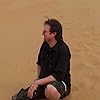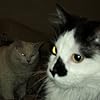Woody
asked
Whitley Strieber:
Can you tell us some details about your forthcoming book with J. Kripal? Can you leak a passage?! Looking forward to it...
Whitley Strieber
Jeff and I do alternating chapters, me as a person who is experiencing high strangeness, him as a professional comparativist, interpreting those experiences in the context of their cultural and historical antecedents.
These are the opening paragraphs of Chapter 1, written by Jeff:
The Already World
Jeff Kripal
They took a little hair off my head and cut my nails. I asked questions in my mind, but before I could verbalize them, they answered back very softly but directly, “We are making a new you.” I asked him, “Are you like angels?” and he replied, “Not as you have been taught.”
an anonymous letter writer in The Communion Letters
I am afraid of Super Natural. There is something about it, something explosive and new. It is not a neutral book. It is an apocalypse of thought waiting for you, the reader, to actualize.
The world will not really end as you turn these pages, of course. Not the real one anyway. Much might well—we hope—be lost. You should know that. But more, much more—really everything—might well be gained. In a few words, this is a book about a new world, the next world that has already arrived, that has always been here, whether we have recognized its presence or not.
In the pages that follow, Whitley and I explore the proposal that we are all embedded in a much larger, fiercely alive and richly conscious reality that is only, at best, indirectly addressed by everything that the human species has ever thought or believed. The religions, for example, have been attempts to look at and engage this conscious reality as if it were primarily concerned with us, but we don’t really know that, and in fact we cannot know that. Not at least yet.
Our proposal? To venture outside the present houses of faith without forgetting those family homes or leaving the spirit behind. To embrace science in a new way, by promoting a more generous vision of the full human experience of reality that can embrace and ponder “more stuff,” especially the wild fantastic stuff that shouts, glows and zaps in these pages. And, above all, to understand, to really understand that we are already and always living in a super natural world, that we ourselves are highly evolved prisms or mediums of this supernature coming into consciousness, and that many of the things that we are constantly told are impossible are in fact not only possible but are the whispered secrets of what we are, where we are and why we are here. This is a book about that Already World.
To my knowledge, nothing like it has ever been attempted. Here, in your hands and head, one of the most widely read figures in the UFO and abduction literatures and a seasoned (take that either way) professor of comparative religion sit down to encounter one another’s thought—seriously and respectfully. As the author of the twentieth century’s most influential and intimate description of an abduction event, Communion (1987), Whitley sets on our shared table his visions of alien spectral figures that seemed at once physical and not physical, at once a thing and a thought, at once sexual and spiritual, at once traumatic and ecstatic. I bring the practices of the professional study of religion to the table in order to explain what historians of religion have written about these paradoxical things (it turns out, a lot) and how we might make sense of them without surrendering our critical faculties and understandable skepticism. We work in tandem. We read each other. We rewrite our chapters in the light of what the other has written. In the process, we rewrite ourselves.
These are the opening paragraphs of Chapter 1, written by Jeff:
The Already World
Jeff Kripal
They took a little hair off my head and cut my nails. I asked questions in my mind, but before I could verbalize them, they answered back very softly but directly, “We are making a new you.” I asked him, “Are you like angels?” and he replied, “Not as you have been taught.”
an anonymous letter writer in The Communion Letters
I am afraid of Super Natural. There is something about it, something explosive and new. It is not a neutral book. It is an apocalypse of thought waiting for you, the reader, to actualize.
The world will not really end as you turn these pages, of course. Not the real one anyway. Much might well—we hope—be lost. You should know that. But more, much more—really everything—might well be gained. In a few words, this is a book about a new world, the next world that has already arrived, that has always been here, whether we have recognized its presence or not.
In the pages that follow, Whitley and I explore the proposal that we are all embedded in a much larger, fiercely alive and richly conscious reality that is only, at best, indirectly addressed by everything that the human species has ever thought or believed. The religions, for example, have been attempts to look at and engage this conscious reality as if it were primarily concerned with us, but we don’t really know that, and in fact we cannot know that. Not at least yet.
Our proposal? To venture outside the present houses of faith without forgetting those family homes or leaving the spirit behind. To embrace science in a new way, by promoting a more generous vision of the full human experience of reality that can embrace and ponder “more stuff,” especially the wild fantastic stuff that shouts, glows and zaps in these pages. And, above all, to understand, to really understand that we are already and always living in a super natural world, that we ourselves are highly evolved prisms or mediums of this supernature coming into consciousness, and that many of the things that we are constantly told are impossible are in fact not only possible but are the whispered secrets of what we are, where we are and why we are here. This is a book about that Already World.
To my knowledge, nothing like it has ever been attempted. Here, in your hands and head, one of the most widely read figures in the UFO and abduction literatures and a seasoned (take that either way) professor of comparative religion sit down to encounter one another’s thought—seriously and respectfully. As the author of the twentieth century’s most influential and intimate description of an abduction event, Communion (1987), Whitley sets on our shared table his visions of alien spectral figures that seemed at once physical and not physical, at once a thing and a thought, at once sexual and spiritual, at once traumatic and ecstatic. I bring the practices of the professional study of religion to the table in order to explain what historians of religion have written about these paradoxical things (it turns out, a lot) and how we might make sense of them without surrendering our critical faculties and understandable skepticism. We work in tandem. We read each other. We rewrite our chapters in the light of what the other has written. In the process, we rewrite ourselves.
More Answered Questions
Jeanne Coppola
asked
Whitley Strieber:
Has any alien investigator ever spent the night in an experiencer’s room to obtain a video of the aliens, or to capture an alien with lasers or electromagnetic radiation? Could an alien be photographed with heat or radiation sensitive cameras? How can I assist alien researchers find tangible proof? I am a senior citizen, who recently read your book "Transformation." It was confusing and frightening.
About Goodreads Q&A
Ask and answer questions about books!
You can pose questions to the Goodreads community with Reader Q&A, or ask your favorite author a question with Ask the Author.
See Featured Authors Answering Questions
Learn more




